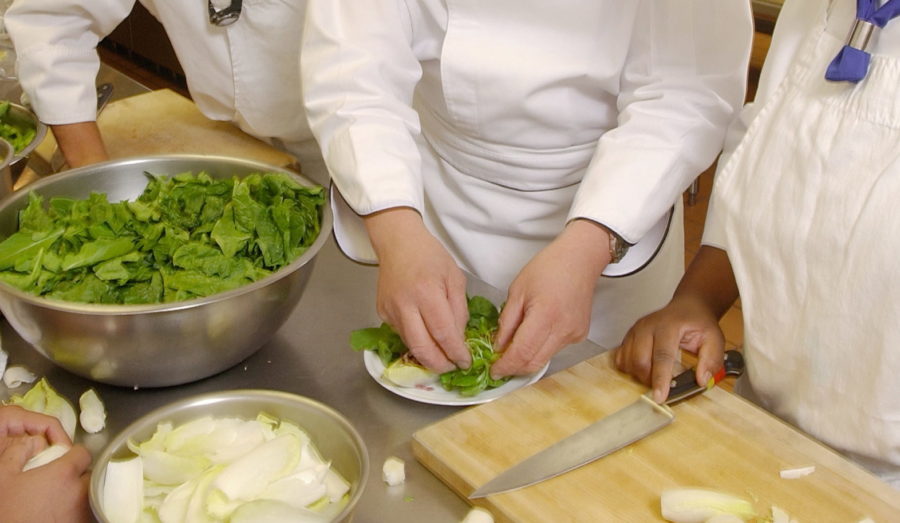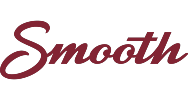Helping students master the art of professionalism and other life skills in NYC’s culinary industry

In 2014, Eliza Loehr had worked in restaurant kitchens, at Heritage Radio Network, a food radio station, and in classrooms teaching elementary-age students how to cook. But that year she found her true calling while producing a radio segment on Governors Island at the Urban Assembly New York Harbor School, where students repopulate oysters in New York Harbor.
She had a brainstorm about launching a culinary public high school, which would arrange internships in the food industry and maybe have an aquaponics program as well. Then the people she met that day told her such a school already existed in the city.
“It was Food and Finance High School,” she said.
On the ferry home, she called the school, which is in Manhattan, left a message offering her varied talents, and a few minutes later received a return call. It led first to her volunteering at the Food and Education Fund, the non-profit that helps support the school. That resulted in a job at Careers through the Culinary Arts Program, which helps connect public high school culinary teachers and their students to curriculum resources and experiences in the food-service industry.
“I decided to move into the job training and career development world as I saw the incredible job they were doing,” Loehr said.
Then, in 2017, she landed a full-time job back at the Fund running the job training and internship program for the students at Food and Finance High.
She teaches them about the life and professional skills they need to succeed in their culinary internships and eventual careers. To create the curriculum, she consulted with chefs and others in the food world about what they’d like to see from those entering the workplace and also listened to students, who shared their struggles in previous work environments, such as sexual harassment or conflicts with coworkers.
The recipe appears to be a success. The school serves a mostly low-income and diverse population of students and boasted a 2018 graduation rate of 87 percent, besting the citywide average, offering both a Regents’ diploma and several food-industry certifications. The Fund also operates its own cafe, which students from Food and Finance High School help to run, managing everything from cooking the muffins and biscuits to handling the food finances and promoting the shop on social media.
Why do you think the culinary arts are such a good match for New York City students?
What I love about the culinary arts is the wide variety of economic opportunities within the industry. Because our students are 13 or 14 when they come to the school, they’re excited about food but don’t necessarily know what it means to work in a kitchen. I’d say about 80 percent come in thinking that’s what they want to do. But by the time they graduate, I’d say 50 percent or less want to. Instead, a lot of students become interested in working in the front of the house of a restaurant or in food science — so for example Cornell University Cooperative Extension operates three Aquaponics labs right in our building. We also have a food media program. We have a teacher who does a food photography club, which is amazing.
So how does your class work?
When I started, there was just one week or so of training before the students went out into internships. I decided to make that a month long, two-and-a-half-hour-a-day class, and then continue once a week throughout the rest of the semester, because it felt like an opportunity to teach students all these things they wouldn’t normally get to learn — like how to manage their personal finances or run an entrepreneurial business, as well as the more usual résumé writing and interview skills. We also talk about anger management in the workplace — how to get along with your co-workers — as well as nutrition and how to use social media to promote a business: just all of these life skills wrapped up in one.
In the fall of 2017, we also found out that our retail cafe space [created for the school] was ready, and so we decided to do a pop-up coffee shop with the internship class. There were students in charge of operations, directing food and beverage, an executive chef, but also students in PR and marketing.
In the spring, we did a different pop-up, a hot-dog shop — so all the same kind of business management training. This fall we launched our full-time student-run School Grounds Cafe. The cafe is open in the mornings from 7:30 to 9:30 on school days. The students make all the muffins and biscuits, and we have bagels and coffee donated.
Can you describe a favorite lesson you teach?
Definitely it’s soft skills — professionalism in the workplace. It feels like such an unknown to them, and there’s so much growth for them from one day to the next, realizing that there are techniques for this. They can see the clear connection between understanding these concepts and doing better for themselves financially.
At first “professionalism” feels like a word from another planet. They’re like ‘What’s that p-word you always use?’ By the end they’re like, ‘That’s not professional!’ to their friends.
How did you come up with a curriculum for the class?
I reached out first to some chefs we work with to find out what were some of the skills they were missing in their kitchens that they’d love students to come in with. Every single one of them said, ‘Show up on time.’ So I made that a big part of the class. I had the students do a podcast where they reached out to an adult in their life and asked them to recall a time when somebody was a no-call or no-show and how that affected them.
I had conversations with other industry leaders and thought about what I wish I’d known before I worked in a kitchen. I also did a survey asking the students what they wanted to learn — and that was mostly nutrition and how to use social media or actual food-costing for their businesses. So that got incorporated into the curriculum, too. Anger management was added this fall at the recommendation of one of my students … different ways to handle coworker conflicts in the moment.
Do your students enjoy learning ‘soft’ skills?
I am always shocked by their response when we talk about attitudes in the workplace, attitudes with other colleagues — passive, aggressive, passive-aggressive, assertive — and how into that lesson they are. They like having tools and language to be able to talk about some things they maybe didn’t have the ability to identify before. So we do a whole class on that — different scenarios — like your boss tells you one thing, but then another boss comes in and tells you another thing. How do you handle that? I’ll have different students play out different roles, and it becomes really clear if I react in this way, this is how another person is going to feel. I think it allows them to step into the shoes of their coworkers or boss … and even with their friends. I don’t think any of them knew that ‘passive-aggressive’ was a term before. But they definitely knew what it was in their lives! And so to be able to see that, name it, and understand why it’s so frustrating and be more clear with your friends, it’s a game changer.
How do you connect with your students?
We run a couple other programs — such as visiting chefs. We do a bunch of different field trips. We did an all-day career day in hopes of getting more students involved. We work with all grades, all students. I work most closely with the senior interns. I meet with each student once a week for 15 minutes to check in with them about their internships. It tends to be a life check-in as well. I don’t think a lot of students really have that kind of regular, one-on-one time with an adult that isn’t a parent. I think it’s been huge, some of the things that have come out — a lot of really difficult conversations have come up about what’s going on in the students’ lives or what’s happened on the job. I put sexual harassment into the curriculum because I felt I needed to prepare them for this reality in many kitchens and workplaces.
Are they experiencing sexual harassment a lot?
Yes — not through our internship program but at other jobs they’ve had, and they are bringing the weight of those experiences into their new work environments. For example, one student didn’t show up at their first day of work because the whole kitchen was male, and it brought up memories of all of these other things that had happened.
In class, we read an article by a former boss of mine at Heritage Radio Network about being a woman in a restaurant kitchen, and the different roles she was always expected to play: like the mother, the person who’s being hit on, or one of the guys — how all of that created more work for her just navigating those roles on top of her already very demanding job.
The reason I had them read that article instead of a straight sexual harassment piece is because I want them to understand that this is complex, that different people have different experiences — that they’re not wrong to feel uncomfortable in some situations … Because students say: ‘I thought feeling that way was not okay, that I just wasn’t tough enough to handle it,’ which is very often the ethos of the kitchen.
It sounds like your students have taught you a lot, too.
All the time, every day!
Can you describe one of those lessons?
I came into teaching being very strict, always. The students have taught me that it’s not just about being strict — it’s really about being clear on the rules. I had one student in particular during the first pop-up who was very stubborn in a way that was very similar to how I’m stubborn! I was micromanaging too much and too much checking in on every single thing. ‘Take out the garbage, do this, do that.’ One day she finally turned to me and said, ‘If you want us to learn, you have to let us do this!’ She was like, ‘You have to let us take control of how the cafe looks.’ And I was like, OK! It totally changed the way I am with the students. I think I’m now much more hands-off once I’ve set the tone and expectations.
What is your biggest challenge?
Even as much as I am always trying to hammer in the lesson of ‘always show up on time’ — this is what a good excuse is, this is what a good excuse is not — our biggest challenge is just the difference between school and work, and some students not understanding that. But they usually get the importance of showing up and on time by the end of the internship, just because a job makes it so real for them.
I think employers also appreciate how we meet with students every week, so they can also email me and say, ‘Hey, this student has been showing up 45 minutes early for work, and it’s not great for us because they’re just hanging around, and we can’t have them clock in too early because we then have to pay them, and can you check in with them on this?’
What is something that might surprise people about your program?
The students run an Instagram account — @schoolgroundscafe is the café account, and @foodandfinancehs is the main account, which I run. On top of that, all of the students who are creating different businesses will create an Instagram account or take over our account for promotion. Its funny that the whole world thinks they’re supposed to be good at social media because they’re teens, but they’re still learning to strike a balance between being authentic and being professional.
You said you wanted students to learn what you wish you’d known when you were their age. Can you give an example?
I remember wanting to pursue a similar career to the people who were right in front of me and not understanding that there is more out there. The adult world is so much bigger. I often advise my students to hold onto their individuality because they willhave a chance to express it in the adult world. Our school is less than 400 people, and I think there’s such a push to conform as a teenager to what everyone else is doing. But then in college and beyond, you realize that there are more people out there, and more people who may be like you. But I think sometimes the things that make kids unique get squashed because of the social pressure.
Another one is taking responsibility for your actions. I think when I was a student, I thought I could get away with a lot of things — that adults didn’t see it. I want my students to realize that whether people can see it or not, you still want to maintain your integrity. People do see. Keep doing the right thing no matter the immediate consequence or reaction to that.

